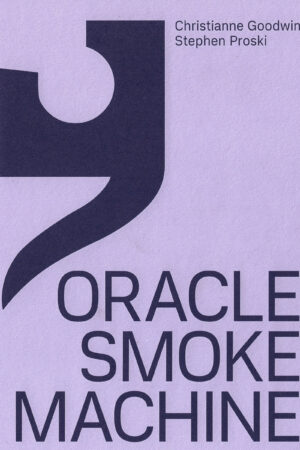Oracle Smoke Machine
by Christianne Goodwin and Stephen Proski
reviewed by Adam Krasnoff
“The folly of mistaking a paradox for a discovery, a metaphor for a proof, a torrent of verbiage for a spring of capital truths, and oneself for an oracle, is inborn in us,” Paul Valéry wrote in his Introduction to the Method of Leonardo Da Vinci. The title of Christianne Goodwin and Stephen Proski’s text-and-image collaboration, Oracle Smoke Machine, cannily evokes the poet’s philosophy of self-deception. These poems flit between the archaic and common-usage meanings of the titular “oracle”—the poet as medium for a kind of prophecy and the poem’s capacity to reply in the clouded form of the obscure. The marriages between Proski’s prints and Goodwin’s lyrics often function in a similar manner, conjuring associations as easily as dissolutions, affinities as quickly as antinomies.
In Goodwin’s poems, the intimacy of a moment (“You, so sweet in your slippers … ”) is often fractured by the voices and visions of history and place. “One Night Only,” the opening poem, evokes a mischievous, Bulgakovian devil-muse inside a Moscow cabaret:
The light rises,
all gasp in recognitionA figure revealed, bearing
the face of a dearest friend
The invocation is redoubled in “Beginner Words,” in which a series of Hungarian words from Bram Stoker’s Dracula are charged with a feverish series of associations, for instance to the Puritan theologian Jonathan Edwards: “like some Great Awakening quip: / a spider hung over hell.” The specters of Central Europe and Russia loom large in this collection. A wealth of aesthetic allusions (“a Klimtish woman,” Prokofiev’s Romeo and Juliet) suggest the influence of forms beyond literature, whether the Austrian painter’s symbolist figures or the Russian composer’s lyrical “dreamballets.” These references often register as absences, as in “The Clarinetist,” in which a slip during the clarinet solo at the close of the ballet burrows deep into the mind of a sleeping listener:
She had been in a pleasant half-dream
cobbled from some distant memory of MoscowNow her mind rolls around
the distinct impression of something
missing, forgotten.
Then there are the poems’ direct linguistic inheritances, smatterings of Hungarian or Russian. For Goodwin, learnt or half-remembered language is slippery, disappearing as quickly as it is spoken. Take, for example, “Russian Lessons,” in which phonetics delineate the border between things Russian and American:
Mo-ya
Star-sha-ya
Ses-traBut at a Plymouth window
no such soundsJust outdoor shower,
four door
Meanwhile, “Underpass” and “The Exhibit” are bright slices of Americana, rife with images of I-90, Cracker Barrel, pickups, power lines, “Do You Know JESUS?” billboards, and an imitation Rothko sunset. The poems’ intercontinental movement is further explicated in the transitory “The Engine,” in which the noise of a train engine “draws / mountains between words” as the poet’s “veins of circulatory thought” begin to resemble “train-patterned scribbles.” For Goodwin, travel is never merely physical, and the mind always lives in multiple places at once.
If anything resembling a solid core is to be found here, it is the addressee of “Sunrise” and “Field Cathedral,” among others, in whom the poems find their most tender and tactile subject. Twin faces of love, these poems revel in the pleasures of the quotidian—a morning walk on the beach, the sleeping body of a lover, the colors of dusk. But love’s frightening counterpart is never far behind, figured in “Field Cathedral” as mingling images of past (“Find myself enfielded / where the warm machines / of foresight once waited … ”) and future (“a vision of our children, / wading through the tall grass … ”).
Each page and enjambed line pulsates with the energy of the unexpected. Goodwin’s fluid, ever-shifting voice brings to mind the pastoral imaginary of Jean Valentine (“Bull-cold dawn on fallow fields … ”), the bitterness of Franz Wright (“Outside, the snow falls grey, / color of a wolf coat … ”), and the gentle cosmopolitanism of Adam Zagajewski (“Good day! May I occupy a table?”), but the acts of threading are all her own.
Proski’s accompanying prints, full of sharp angles, perspectival disorientations, and motifs—devils, road signs, eyes, cathedrals—that leap from the poems into the images, embody the text’s vacillation between the beautiful and the absurd, the ominous and the everyday, the real and the fantastic. Just as the poems ferry between tongues, the dialogue between word and image resembles the play of alternating languages, opposed yet interlocked. “I’m coming to the end / of my visions,” Goodwin writes at the start of “Field Cathedral.” This chapbook is proof to the contrary.
Published on May 27, 2024

